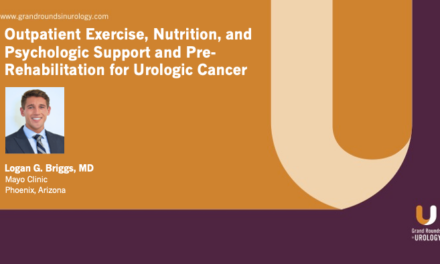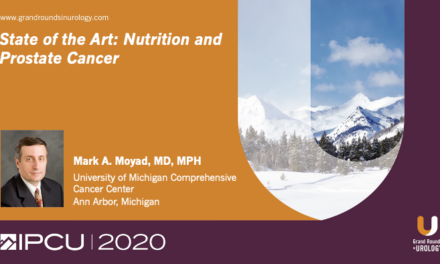Mark A. Moyad, MD, MPH, presented “Vitamin D for Preventing Fractures in Low-Risk Adults: What Can We Learn from the VITAL Study?” for the Grand Rounds in Urology audience in August 2022.
How to cite: Moyad, Mark A. “Vitamin D for Preventing Fractures in Low-Risk Adults: What Can We Learn from the VITAL Study?.” August 2022. Accessed Nov 2025. https://grandroundsinurology.com/vitamin-d-for-preventing-fractures-in-low-risk-adults-what-can-we-learn-from-the-vital-study/
Summary:
Mark A. Moyad, MD, MPH, the Jenkins/Pokempner Director of Preventive/Complementary and Alternative Medicine (CAM) in the Department of Urology at the University of Michigan Medical Center in Ann Arbor, Michigan, reviews ancillary data from the VITAL study on using supplemental vitamin D to prevent bone fractures. Dr. Moyad notes that while recent reporting indicated data from the study showed no benefit for reducing fractures, the focus was only on low-risk adults (those without vitamin D deficiency, low bone mass, nor osteoporosis). He stresses keeping vitamin D testing in perspective; due to public health efforts such as fortification in milk, multivitamins, and other products, severe vitamin D deficiency (<12 ng/ml=30 nmol/l) is a rare occurrence. While most adults are in the adequate threshold (>20 ng/ml=50 nmol/l), other studies have proven excessive levels (>50 ng/ml=125 nmol/l) can increase the risk of hypercalcemia and hypercalciuria, which can increase risk of stones, falls, or fractures. Dr. Moyad points to the baseline data from the study that showed the participants began with a vitamin D blood level that was healthy, at 30 ng/ml=75 nmol/l; therefore, he asserts it is not a surprise that increasing vitamin D from this level did not reduce the risk of fracture from falls. He explains that in oncology and urology vitamin D has a different role that is not discussed and that is in terms of counteracting hypocalcemia for patients on certain medications. He cites three drugs—Xgeva (denosumab), Zometa (zoledronic acid), and Reclast (zoledronic acid) and explains that treatment with any of these may worsen hypocalcemia and patients must be adequately supplemented with calcium and vitamin D. He emphasizes that for people at high risk for bone loss, vitamin D supplementation offers benefits; he cites data from the VITAL study that show a slight benefit of vitamin D supplementation for those taking osteoporosis medication. Dr. Moyad concludes by emphasizing extra vitamin D will work no better than a placebo in healthy patients and reiterating the comprehensive nature of the VITAL study.
Dr. Moyad also edits the GRU Next Generation Health, Exercise and Wellness Learning Center – be sure to check out his talks there for more on similar topics.
ABOUT THE AUTHOR
Dr. Moyad’s mission is to promote a greater attention to comprehensive lifestyle changes to improve overall mental, physical, and spiritual wellness along with contributing to more objective education on dietary supplements, OTC, and other potential health options. This has been the focus of his research, writings, and lectures his entire career. He occupies an endowed position, which was originally created and funded by the individuals he has empowered over the past 25+ years. He is the Jenkins/Pokempner Director of Complementary and Alternative Medicine (CAM) Education at the University of Michigan Medical Center in the Department of Urology. This was one of the first endowments of its kind created for a doctor at a major medical center. Dr. Moyad has always considered himself to be first, and foremost, a public health educator with an expertise in clinical/medical epidemiology. Dr. Moyad received his medical education from the University of South Florida College of Public Health and the Wayne State University School of Medicine. He is the primary author of over 150 medical journal publications on lifestyle changes and supplements, the past Editor-in-Chief of the medical journal Seminars in Preventive & Alternative Medicine, past CAM course director for a variety of medical societies, continues to be a guest editor and provide peer review for multiple medical journals, and he has given thousands of lectures around the world to the public and health care professionals in virtually every medical specialty and major medical center. Dr. Moyad is the author or co-author of 15 academic and consumer books, and now interviews other health experts on a variety of global wellness topics to enhance notable health care professional and patient education sources. He is also honored to be the moderator of one of the largest patient conferences held twice a year in Los Angeles, California, and has provided educational clinical research updates for the last 20+ years to health care professionals and national patient advocacy groups.



